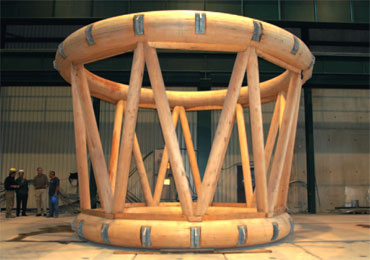Geneva, 1 March 2004. Celebrations to mark the 50th anniversary of CERN1 officially begin on 8 March with the launch of a Swiss postage stamp dedicated to the Organization.
At a press conference in Geneva, the stamp will be presented and details of events to mark the anniversary throughout the Organization's Member States will be unveiled.
CERN was born from the vision of a small number of scientists who saw the opportunity not only to build a world-class laboratory for nuclear and particle physics in Europe, but also to bring nations together through science. CERN's founding convention emphasises that the Organization should foster international collaboration and promote contacts between and interchange of scientists.
The Organization is also charged with making its results freely available, providing advanced training, and working in close collaboration with other research institutions. “When the 12 founding Member States ratified the CERN convention on 29 September 1954,” explains CERN's Director General Robert Aymar, “they gave the new organization a mission to provide first class facilities, to coordinate fundamental research in particle physics, and to help reunite the countries of Europe after two world wars.”
In all of these, CERN has succeeded. Its unique facilities play host to around half the world's particle physicists, its membership has grown to 20 European states, with many countries from beyond the European region also taking part, and its Member States have pooled their resources to make CERN their national laboratory for particle physics. “It is no accident,” says Aymar, “that many of the countries about to join the European Union are already members of CERN. Scientific collaboration has proved to be a valuable step on the way to collaboration at the political level.”
In the Organization's golden jubilee year, CERN is focusing on the Large Hadron Collider (LHC), which will be the world's largest and most complex scientific instrument when it switches on in 2007. Experiments at the LHC will allow physicists to complete a journey that started with Newton's description of gravity. Gravity acts on mass, but so far science is unable to explain why the fundamental particles have the masses they have. Experiments at the LHC may provide the answer. LHC experiments will also probe the mysterious missing mass and dark energy of the universe – visible matter seems to account for just 5% of what must exist. They will investigate the reason for nature's preference for matter over antimatter, and they will probe matter as it existed at the very beginning of time.
CERN's reputation is based on fundamental research, but the Organization is also an important source of new technologies. This is particularly true in the area of information technology. The World Wide Web was invented at CERN, and today the Organization is in the vanguard of the effort to develop a globally distributed computing system known as the Grid.
Among events planned by the Member States to mark the anniversary are an art exhibition inspired by science, a concert of classical music, and several public lectures and exhibitions.
On 29 September, people celebrating their 50th birthday this year will blow out the candles on a giant birthday cake, an event that will be transmitted live over the Internet. At CERN, events throughout the year will culminate in October with an official ceremony to be held in the Organization's new exhibition and networking centre, the Globe of Innovation, and a public Open Day. The Globe, an iconic 27 metre high spherical wooden building, was generously offered to CERN by the Swiss Confederation. Other events will include a Europe-wide scientific challenge on the Web, and a bid to assemble a record amount of computing power in a single world-spanning computing Grid. The commemorative stamp, designed by Swiss artists Christian Stuker and Beat Trummer, aims to encapsulate the spirit of CERN on an area 28 by 33 millimetres. It has a value of 1.80 CHF and will be available from 9 March. It can be ordered on the Internet at www.post.ch/philashop.
Website 50th celebrations
1. CERN, the European Organization for Nuclear Research, has its headquarters in Geneva. At present, its Member States are Austria, Belgium, Bulgaria, the Czech Republic, Denmark, Finland, France, Germany, Greece, Hungary, Italy, The Netherlands, Norway, Poland, Portugal, the Slovak Republic, Spain, Sweden, Switzerland and the United Kingdom. India, Israel, Japan, the Russian Federation, the United States of America, Turkey, the European Commission and UNESCO have observer status.
